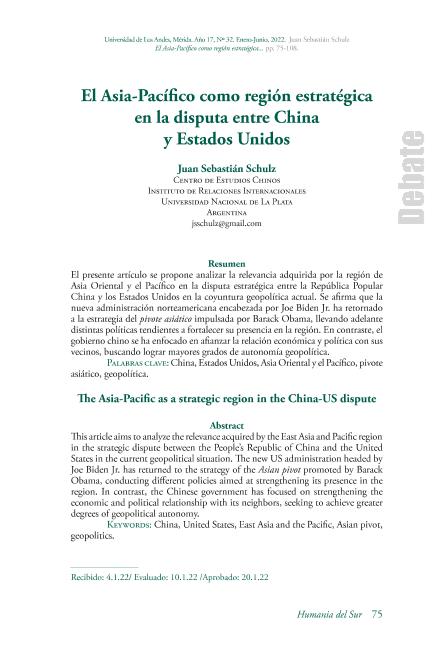Artículo
El presente artículo se propone analizar la relevancia adquirida por la región de Asia Oriental y el Pacífico en la disputa estratégica entre la República Popular China y los Estados Unidos en la coyuntura geopolítica actual. Se afirma que la nueva administración norteamericana encabezada por Joe Biden Jr. ha retornado a la estrategia del pivote asiático impulsada por Barack Obama, llevando adelante distintas políticas tendientes a fortalecer su presencia en la región. En contraste, el gobierno chino se ha enfocado en afianzar la relación económica y política con sus vecinos, buscando lograr mayores grados de autonomía geopolítica. This article aims to analyze the relevance acquired by the East Asia and Pacific region in the strategic dispute between the People’s Republic of China and the United States in the current geopolitical situation. The new US administration headed by Joe Biden Jr. has returned to the strategy of the Asian pivot promoted by Barack Obama, conducting different policies aimed at strengthening its presence in the region. In contrast, the Chinese government has focused on strengthening the economic and political relationship with its neighbors, seeking to achieve greater degrees of geopolitical autonomy.
El Asia-Pacífico como región estratégica en la disputa entre China y Estados Unidos
Título:
The Asia-Pacific as a strategic region in the China-US dispute
Fecha de publicación:
05/2022
Editorial:
Universidad de Los Andes. Facultad de Humanidades y Educación
Revista:
Humania del Sur
ISSN:
1856-6812
Idioma:
Español
Tipo de recurso:
Artículo publicado
Clasificación temática:
Resumen
Archivos asociados
Licencia
Identificadores
Colecciones
Articulos(IDIHCS)
Articulos de INST.DE INVEST.EN HUMANIDADES Y CS SOCIALES
Articulos de INST.DE INVEST.EN HUMANIDADES Y CS SOCIALES
Citación
Schulz, Juan Sebastián; El Asia-Pacífico como región estratégica en la disputa entre China y Estados Unidos; Universidad de Los Andes. Facultad de Humanidades y Educación; Humania del Sur; 32; 17; 5-2022; 75-108
Compartir




